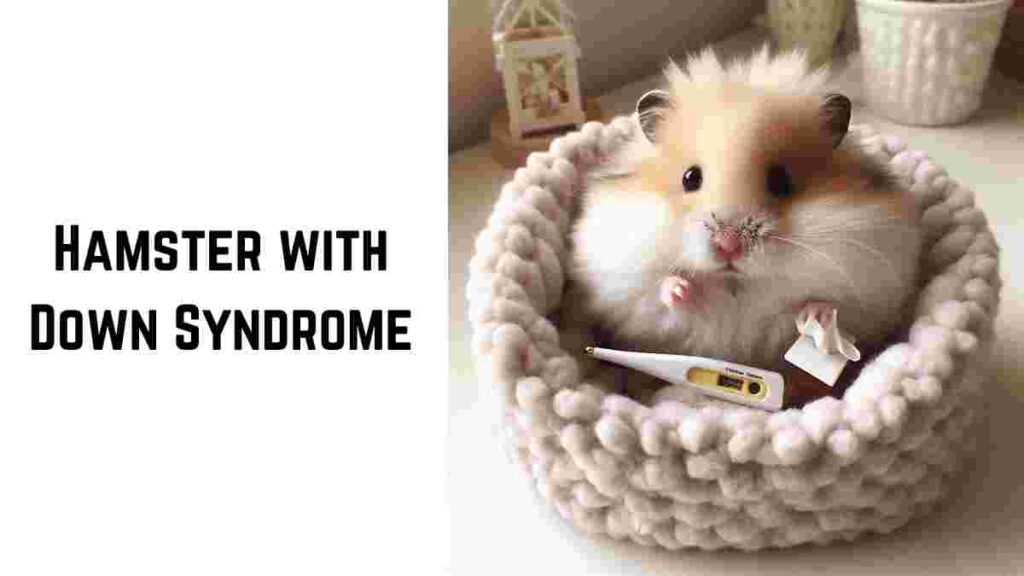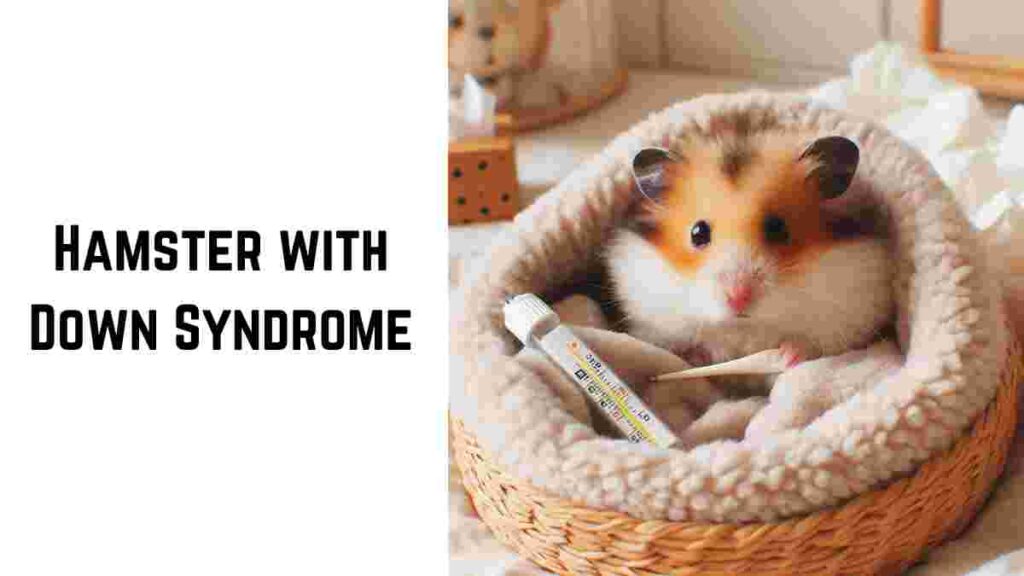Hamster with Down Syndrome: Hamsters are among the most popular small pets around the world. They are known for their playful behavior, adorable appearance, and ease of care, making them a favorite choice for many pet owners. However, like all animals, hamsters can suffer from various health conditions. Among the myriad of health concerns, the notion of a “Hamster with Down syndrome” has surfaced in discussions and forums.
But what does this really mean? Is it possible for a hamster to have Down syndrome, or is this a misunderstanding of genetic conditions in animals? This article delves into the biology, genetics, and common misconceptions surrounding this topic.
Click here to ensure the best nutrition for your rodent friend
Find the best hamster wheels from here

Table of Contents
Understanding Hamster with Down Syndrome
To understand the concept of Down syndrome in animals, it’s crucial first to grasp what Down syndrome is in humans. Down syndrome, also known as trisomy 21, is a genetic disorder caused by the presence of an extra chromosome 21. This condition leads to developmental and intellectual delays, characteristic facial features, and sometimes health issues such as heart defects.
Genetic Differences Between Humans and Hamsters
Hamsters, like humans, have chromosomes that carry their genetic information. However, there are significant differences in the number and structure of these chromosomes. Humans have 23 pairs of chromosomes, totaling 46, while hamsters have different numbers of chromosomes depending on the species. For instance, the Syrian hamster (Mesocricetus auratus) has 44 chromosomes, while the Chinese hamster (Cricetulus griseus) has 22 chromosomes.
Table 1: Chromosome Numbers in Different Hamster Species
| Hamster Species | Chromosome Number |
|---|---|
| Syrian Hamster (Mesocricetus auratus) | 44 |
| Chinese Hamster (Cricetulus griseus) | 22 |
| Campbell’s Dwarf Hamster (Phodopus campbelli) | 28 |
| Roborovski Dwarf Hamster (Phodopus roborovskii) | 34 |
Genetic Disorders in Hamsters
While hamsters do not get Down syndrome as humans do, they can suffer from genetic disorders that affect their health and development. Some of these conditions may present with symptoms that owners could misinterpret as similar to those seen in Down syndrome. Common genetic disorders in hamsters include:
- Dental Problems: Malocclusion, where the teeth do not align properly, leading to overgrown teeth.
- Neurological Disorders: Conditions like epilepsy or other seizure disorders.
- Congenital Defects: Various birth defects that can affect physical appearance and functionality.

Common Misconceptions: Hamsters and Down Syndrome
Facial Deformities
One of the primary reasons people might think a hamster has Down syndrome is due to facial deformities or unusual facial features. However, these deformities are typically due to other genetic issues or environmental factors during development.
Behavioral Differences
Another reason for this misconception could be behavioral differences. A hamster with neurological issues or a congenital defect might display abnormal behavior, leading owners to believe it has a condition similar to Down syndrome.
Comparing Genetic Disorders
It’s important to clarify the nature of genetic disorders in animals versus humans. While humans can have a specific condition like Down syndrome due to an extra chromosome 21, animals, including hamsters, can have a variety of genetic anomalies, but they do not equate to Down syndrome.
Table 2: Comparison of Genetic Disorders
| Aspect | Down Syndrome in Humans | Genetic Disorders in Hamsters |
|---|---|---|
| Cause | Extra chromosome 21 | Various genetic anomalies |
| Common Symptoms | Intellectual disability, facial features, heart defects | Dental issues, neurological disorders, physical deformities |
| Diagnosis | Genetic testing (karyotyping) | Veterinary examination, genetic testing (if available) |
| Treatment | Supportive care, medical intervention | Veterinary care, supportive management |
How to Care for a Hamster with a Genetic Disorder
Veterinary Care
Regular check-ups with a veterinarian are crucial for diagnosing and managing genetic disorders in hamsters. While a vet cannot diagnose Down syndrome in a hamster, they can identify and treat various health issues.
Proper Nutrition
Providing a balanced diet is essential for any hamster, but even more so for those with genetic disorders. Ensure they receive the right nutrients to support their overall health.
Enriched Environment
An enriched environment with plenty of mental and physical stimulation can help manage behavioral issues in hamsters. This includes a spacious cage, exercise wheels, toys, and regular interaction.
Monitoring and Adaptation
Owners should closely monitor their hamsters for any changes in behavior or health and adapt their care routine as needed. This may involve modifying the cage to prevent injury if the hamster has mobility issues.

Conclusion – Hamster with Down Syndrome
The idea of a hamster having Down syndrome is a myth rooted in misunderstanding genetic conditions in animals. While hamsters cannot have Down syndrome, they can suffer from a variety of genetic disorders that may affect their appearance and behavior.
Understanding these differences is crucial for providing the best care for these small pets. By recognizing the signs of genetic disorders and seeking appropriate veterinary care, owners can ensure their hamsters lead healthy and fulfilling lives.
In essence, while the term “Down syndrome” should not be applied to hamsters, awareness of their potential genetic health issues remains vital for responsible pet ownership.
Frequently Asked Questions (FAQ) – Hamster with Down Syndrome
Can hamsters have Down syndrome?
No, hamsters cannot have Down syndrome. Down syndrome is a specific genetic condition in humans caused by an extra chromosome 21. Hamsters have different chromosome numbers and structures, so they cannot have the same condition.
Why do people think hamsters can have Down syndrome?
People may mistakenly believe hamsters can have Down syndrome due to certain genetic disorders or congenital defects that cause unusual facial features or behaviors in hamsters, which may superficially resemble symptoms of Down syndrome in humans.
What are common genetic disorders in hamsters?
Common genetic disorders in hamsters include dental problems (like malocclusion), neurological disorders (such as epilepsy or seizures), and various congenital defects that can affect their physical appearance and functionality.
How can I tell if my hamster has a genetic disorder?
Signs of genetic disorders in hamsters can include abnormal physical features, unusual behavior, difficulty eating, mobility issues, or recurrent health problems. If you notice any of these signs, consult a veterinarian for a proper diagnosis and treatment plan.
What should I do if I suspect my hamster has a genetic disorder?
If you suspect your hamster has a genetic disorder, seek veterinary care immediately. A veterinarian can conduct a thorough examination, provide a diagnosis, and recommend appropriate treatments or management strategies to ensure your hamster’s well-being.
Is there a way to prevent genetic disorders in hamsters?
While it’s impossible to prevent all genetic disorders, selecting hamsters from reputable breeders who practice responsible breeding can reduce the risk. Ensuring a healthy environment, proper diet, and regular veterinary check-ups can also help manage and mitigate potential health issues.
What kind of diet is best for a hamster with a genetic disorder?
A balanced diet is crucial for hamsters with genetic disorders. Ensure they receive a mix of high-quality hamster pellets, fresh vegetables, occasional fruits, and clean water. Specific dietary needs may vary based on the disorder, so consult your vet for personalized recommendations.
How can I provide a good environment for a hamster with a genetic disorder?
Create a spacious and safe cage with plenty of enrichment, such as exercise wheels, tunnels, and toys. Make adaptations as necessary, such as ramps for hamsters with mobility issues. Regularly clean the cage and provide fresh bedding to maintain a healthy environment.
Can genetic disorders in hamsters be treated?
While some genetic disorders in hamsters can be managed with veterinary care and proper husbandry, others may not have a cure. Treatment focuses on improving the hamster’s quality of life through supportive care, medication, and environmental modifications.
Are there specific breeds of hamsters more prone to genetic disorders?
Certain hamster breeds may be more prone to specific genetic issues due to their breeding history. For example, Syrian hamsters might be more susceptible to dental problems, while dwarf hamsters could face different health challenges. It’s essential to research and choose a healthy breed from a responsible breeder.
Understanding the nature of genetic disorders in hamsters is crucial for providing appropriate care and ensuring their health and well-being. While hamsters cannot have Down syndrome, recognizing and addressing their unique health needs is vital for responsible pet ownership.
